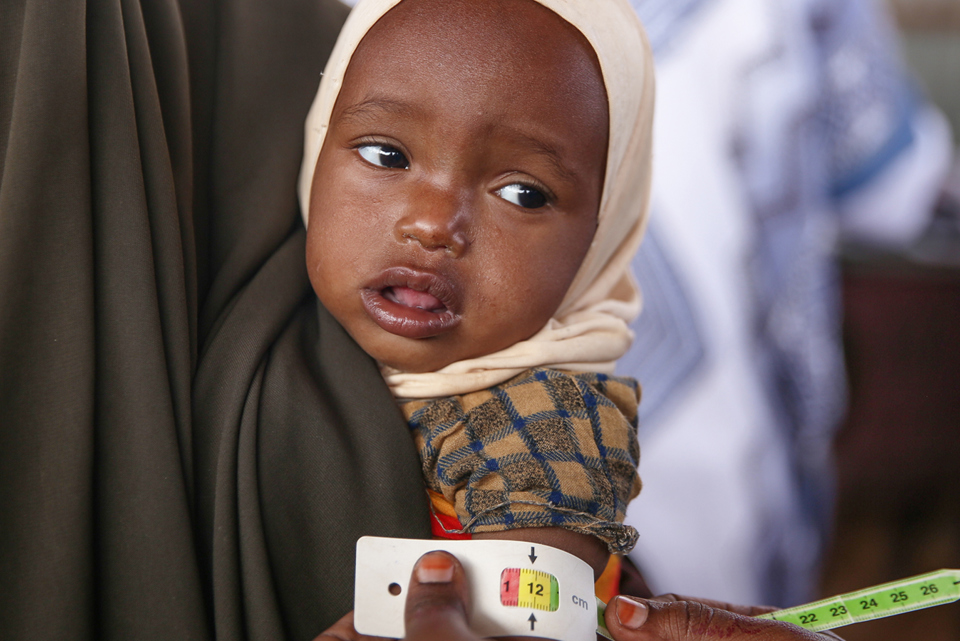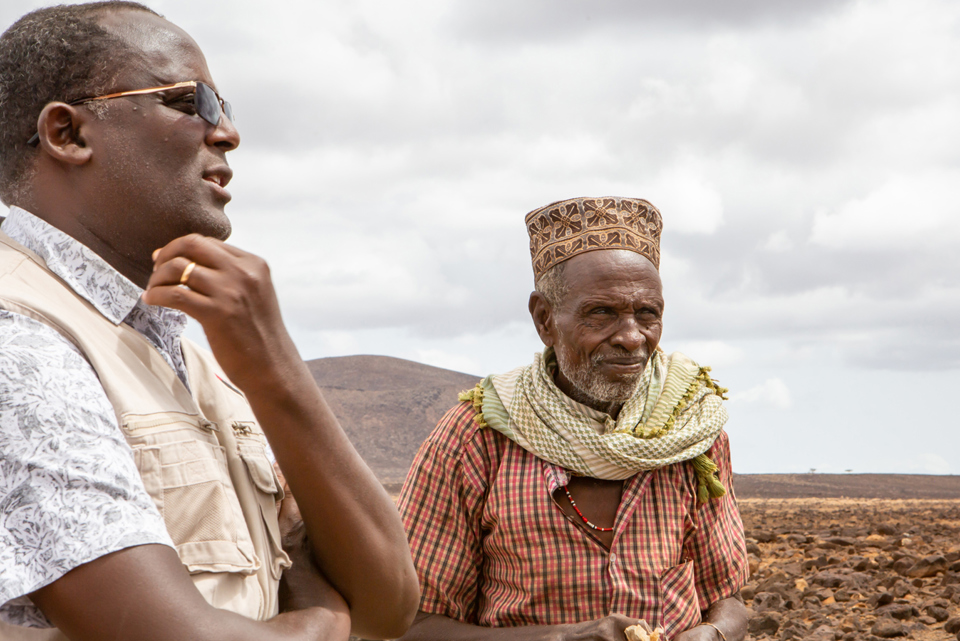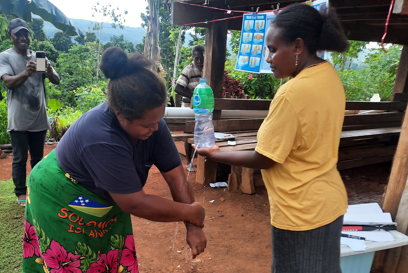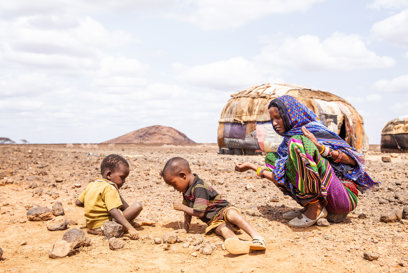
Talaso, a Kenyan mother, faces a future of drought and starvation. Credit: Thom Flint, Catholic Agency for Overseas Development
In March, The Intergovernmental Panel on Climate Change (IPCC) delivered its Sixth Assessment Report where leading scientists have issued an ‘urgent warning’ on the climate crisis. Thanks to the generosity of supporters like you, Caritas Australia is taking action against climate change by implementing new programs across the Pacific region and Africa to further support communities at risk.
What is the Intergovernmental Panel on Climate Change? And what is its function?
The IPCC is a United Nations intergovernmental body that currently has 195 member countries. Reports by the IPCC are created by a large group of volunteer scientists and experts who review thousands of scientific papers published around the world each year. The report is then reviewed by several experts and governments around the world, to ensure a high level of objectivity. The IPCC Reports provide a strong basis for governments to make decisions about climate change (About the IPCC, IPCC website).
At the moment, governments and decision makers are collectively falling behind on climate targets to limit global warming to less than 1.5°C below pre-industrial levels – the planet already sits at around 1.1°C of warming today. The IPCC Report implores policymakers to take action to keep below a 1.5°C warming threshold, as it would ‘substantially reduce projected losses and damages related to climate change in human systems and ecosystems, compared to higher warming levels,’ (page 13, IPCC AR6 Summary for Policymakers).
Your support today is helping communities affected by severe weather patterns, decreased food and water security, natural disasters, financial loss, and increased climate-related poverty. Caritas Australia does this through programs, disaster relief, development and advocacy work.
What impacts does climate change have on people in vulnerable communities?
Climate change is already having far-reaching consequences across the planet and is affecting many of the communities that we work with.
According to the IPCC’s Sixth Assessment Report, change has already been observed in all forms of ecosystem structures across small islands, and this is set to increase (page 10, IPCC AR6 Summary for Policymakers). As Island Nations populations frequently rely on their natural surroundings for livelihoods and way of life, we are seeing these effects first-hand in many of the communities we serve across the Pacific. Extreme weather events like storms and floods are on the rise, as are ocean levels. Populations are scrambling to adapt. Burial grounds with people’s ancestors are being washed away by large tides, communities are creating makeshift dykes against the ocean out of old tires as they struggle to access climate finance.
Watch this video:
Maina Talia (Tuvalu Climate Action Network) highlights the effects of climate change in the Pacific and his home in Tuvalu.
We are also seeing an increase in the amount and severity of droughts and floods, resulting in higher levels of water scarcity.
Reflected in the IPCC, Caritas Australia’s partners are seeing this directly. They are witnessing the abrupt losses to crops and yields, and loss of access to food. This is increasing malnutrition in many communities around the world, and extreme hunger in places like Yemen, Syria, Somalia, Kenya, Zimbabwe and Ethiopia.
A few months ago, we spoke to Paul Healy, who works with our partners, Trócaire, in Somalia. His words were dire: “Right at its core is the drought and it is very clearly the impact of climate change… When you see children dying on the side of the road and parents having to bury them and keep moving to internally displaced camps so that the rest of their children can survive, that’s what it’s like.”

A Somalian child is measured for stunting, a consequence of chronic malnourishment. Credit: Trócaire.
What is Caritas Australia doing to combat climate change and its effects?
Thanks to your generosity, we support programs across Africa, Asia and the Pacific that combat the increasing effects of water scarcity, improve food security and resource diversity, and support Disaster Risk Reduction training.
Here are some snapshots:
The Zimbabwe Integrated Community Development Program
This program tackles food insecurity exacerbated by climate change in the region. With your support, this program has helped 10,500 people gain access to strengthened food security and improved nutrition, 734 farming households have reported increased income by 60% through adopting improved conservation farming techniques and linking to markets for their produce, and over 14,500 people have improved access to water sources in communities and schools.
Supporting partners in the Horn of Africa
A record number of people in Africa have been in urgent need of humanitarian aid over the past year. Over 18 million people face severe hunger in the Horn of Africa and this is increasing (UNHCR, 2022).
Caritas Australia works with partners in Ethiopia, Somalia, Eritrea, South Sudan, Kenya, and other African countries facing record hunger including Mozambique and Zimbabwe to provide food distributions, support to children facing malnutrition, clean drinking water and sanitation support, hygiene supplies that prevent disease, seeds and household items for families who have been displaced, and cash transfers for families facing immediate risk of poverty.

Isacko Molu, Director of Caritas Marsabit, talking to pastoralists in Kenya during a drought response visit. Credit: Thom Flint, Catholic Agency for Overseas Development.
Ecosystem restoration for community sustainability in Falease’elā, Samoa
We are working with our partners Caritas Samoa and the Falease’ela Environment Protection Society (FEPS) on a two-year program of ecosystem restoration to harness community sustainability. This program delivers environmental protection, protects cultural heritage and develops sustainable livelihoods to help villages and communities adapt and be resilient to the increased extremity and frequency of weather events as a result of climate change.
Caritas Australia has also focused its efforts on advocating for more climate action from governments and policy makers. Caritas Oceania and Jubilee Australia Research Centre instigated the first ever report that took a thorough look at debt, climate change, and the compound effects of these in the Pacific. The report is called “Twin Clouds”.
In addition to this, our Advocacy Associate Director, Dr. Damian Spruce, attended COP27 – a United Nations Climate Change Conference to advocate for climate action amidst thousands of participants and heads of governments. Our advocacy work there focused on the Pacific, to stand up for their rights to adaptation, and make the Pacific Islands habitable into future.
Speaking on climate finance and mitigation in the Pacific, President of Caritas Oceania, Cardinal Soane Patita Paini Mafi said: “Put simply, it is now or never. The real challenge for the world is to see with their eyes, and listen with their ears, to those on the frontlines of climate change – listen and see, then act. Act now before it is too late.”
We all have a responsibility collectively to do what we can now to act on climate change, because as the IPCC report has shown, we cannot afford not to. We are immensely grateful for generous supporters like you who are standing with the most vulnerable communities on the frontline of climate change.
Find out more about what we are doing on climate change here, climate justice here, and how we are empowering those most vulnerable against the effects of climate change here.

















